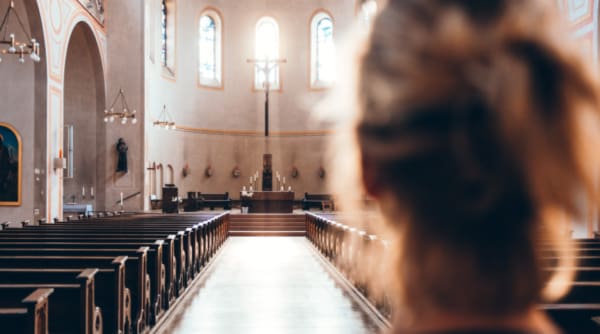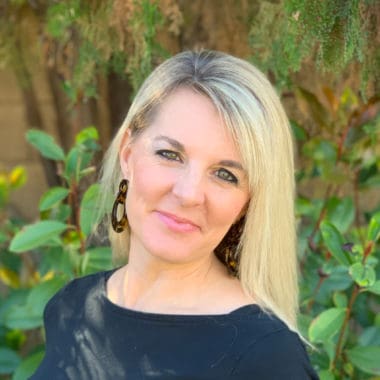Part 36 of This Present Paradise
A Series of Reflections on St. Elizabeth of the Trinity
(Start with part 1 here.)
Have you ever waved good-bye to someone heading off to a mission or pilgrimage and turned back into the house, baby on your hip, to face a pile of laundry on the couch and sticky breakfast dishes spread across the counter?
Have you rubbed your eyes over a keyboard or spreadsheet, knots in your shoulders and in your stomach, and daydreamed of a thirty-day retreat? Although you’d settle for a weekend. Anything.
Or maybe you’ve stood in line at the super-sized grocery store and wondered what it would be like to live a hermitage, a convent, a cave even—anywhere quiet. Then, maybe, you’d hear God. Then, maybe, you could find peace. Then, maybe, you could taste a little of what Elizabeth seemed to be savoring in her quiet, her solitude, her recollection, even her suffering.
St. Elizabeth of the Trinity knows the burdens we carry. She knows our longing for God, the incessant internal noise of our worries and anxieties and the constant stream of distractions that seem to frustrate our search for Him at every turn. And in the middle of the suffering of her final illness, thinking about all of those things, she took out a black notebook and began to write.
She filled seventy pages with luminous reflections on themes that had been resonating in her prayer: the divine indwelling, remaining in God, the example of the Virgin Mary, and living our eternal destiny beginning even now. She divided them into ten days, two reflections for each day, and designed a personal ‘retreat’ for her sister: something to remember her by and to use as a guide in her own spiritual journey as a mom and a wife whose life resembled very little the cloistered convent where her sister had spent the last five years.
But while on the surface, Guite’s life looked far different than her own, Elizabeth knew that holiness was for everyone, and no state in life was excluded from knowing the Lord with the intimacy she had come to enjoy. She wanted that so badly for her sister. She wants that relationship of divine love for each of us. So she wrote words with that in mind: that no one—no one—was created to exist outside of the love of the Holy Trinity.
Guite wouldn’t find out about this retreat until the notebook was given to her by Mother Germaine two months after Elizabeth had died. Now, “Heaven in Faith,” as it has come to be known, (along with her equally magnificent “Last Retreat”) is a gift to the world.
It was the first thing I read of Elizabeth’s. And as I said in the beginning, it struck me as the key to being a recollected mom. “Heaven in Faith” was the lane on the spiritual highway which smoothly merged “the Carmel and the kitchen” and “the cloister and the carpool.” We are all, in the end, going in the same direction.
It is beyond the scope of this series to examine her last writings, worthy as they are, in great depth, analyzing each phrase and scrutinizing each source. But let’s stand back and look at “Heaven in Faith” as a beautiful whole and a hopeful message for our world-weary hearts, and consider some of her themes as they play out in our lives. Following is my attempt to summarize Heaven in Faith.
Jesus Christ, from His communion of love in the Trinity, desires that we be where He is—even now, here on earth, in time, surrounded by crumbs and receipts and sticky notes. Elizabeth wants us, from the very beginning of the retreat, to know that our home is in God—and not just in some distant future or far-off place or only for a few stolen and fleeting moments but habitually, permanently, and deep within our own hearts. This is nothing less than the sharing in the very life of the Trinity—what we were baptized into, what our souls were shaped for.
The rediscovery of God in our ‘center’ is an ever-deepening encounter of our ‘abyss’ (Elizabeth loved that word and used it often) of emptiness and longing and the expanse of God’s merciful love: where a ‘divine impact’ takes place (HF 4). To facilitate that encounter, God has designed everything in life to give Himself to us.
“Each incident, each event, each suffering, as well as each joy, is a sacrament which gives God to (every soul).” ( 10) Each little summons from our state in life, our duties, and our personal mission is a revelation of God and His will in each precise moment of our life. Nothing is meaningless.
But, Elizabeth reminds us, everything else—everything outside of His will–must be renounced. We must be stripped of everything other than God, at least in spirit. All the things that once seemed so important have to be allowed to lose their tight-fisted grip on our hearts. We must be fully surrendered, our wills conformed completely into God’s, and allow ourselves to be transformed to the point that “the Father in bending attentively over me can recognize the image of His beloved Son in whom He has placed all His delight.” ( 12)
There is a divine fire in our deepest center, a furnace of love that destroys our sin and purifies and renews us. It is nothing less than the Holy Spirit Himself, whom we find through the flames, hidden in our acts of pure faith when darkness conceals His secret, penetrating work in the soul.
Elizabeth draws from her reading of St. John of the Cross and continues: In the Holy Spirit, the soul finds itself absorbed in loving God “‘even in its relations in the world’, ‘in the midst of life’s cares it can rightly say: “My only occupation is loving.’” ( 16) And as we continuously love God in the demand of each moment, we discover a God who is “continually coming.” ( 17)
God comes and His love so fills us that we love Him—and others—with His own love:
We forgive with His forgiveness.
We see with His eyes.
We think with His mind.
We feel with His Heart.
Each movement of love, each expression of grace and wisdom is another visitation of Jesus to our hearts and a manifestation of His continual coming.
We are called to be receptive, then, to the gentle knock that invites us to open the door of our heart to a tired child, a sick parent, a frustrated co-worker, a burdened heart, a broken life. Just when we think we have nothing left to love with (because it is true: “He asks for more than we are capable of giving” ( 18)) we will find a swift surge from within that is more than us—that is God, in another coming. Every time He enters the soul He exhales more of Himself with the same breath that first stirred our clay, and the soul expands to receive Him, ever capable of more self-gift and more of the sweet but sometimes heavy demands of love.
What if we don’t feel this love?
Elizabeth speaks from experience: when God is silent, we go to Him by faith, a faith so powerful it actually makes things present in our souls before we possess their fulfillment. In other words, to choose to believe is to possess God, to receive our inheritance even when He hides Himself in a darkness the soul can’t understand. To hold all of heaven within us even when the shutters are closed and all we can see is a sliver of light and our own dust floating in what feels like emptiness. “Faith gives us God.” (19)
When we make an act of faith, says Elizabeth, we give God our blind but unshakable love.
We feel no consolation. We love Him.
We see no miracle. We love Him.
We receive no answer. We love Him.
We struggle and fall. We love Him.
The world may crumble around us and collapse back in on itself and we will stand on the rubble and look into the sky and love Him.
And the accepting stillness, the quiet, assenting nod of our heart—that is the sound of our love returning His own.
Here we come to a beautiful paradox. Our souls, stripped and tried and tested and surrendered, finally in the center of ourselves, encounter not only the God who chose us for Himself from the beginning—we also encounter the image we were designed to bear. We find the true meaning of what it is to be human. We find ourselves.
We walk this earth as living images, eternally drawn to the One who has impressed Himself upon us. When we find Him, there, in our center, our “little heaven,” (32) it is with a cry of recognition: Here is God, and here is me, too—the true me, the redeemed me, the me He thought of from the beginning to reflect His glory in the shape of my particular soul.
And every soul was created with this image, and every soul was created to know God in the depths of the heart—every soul was created to be holy. The one who is ‘most holy’ is not necessarily the one in the convent or the monastery even the Papal Palace but the one who remains under His gaze and allows it to melt and mold the soul “like the seal on wax, like the stamp on its object.” (24). This, Elizabeth reveals, is the object of the retreat: “to make us more like our adored Master” (28), to become what we were destined for from the beginning.
To be like Christ is to embrace fully the will of the Father—whatever He wants for us, we want, even if that means our own small crucifixions: “we will,” resolves Elizabeth, “climb our calvary singing.” (30)
Elizabeth reflects on the great mercy of God in the face of our sinfulness, on the humility of heart necessary to descend to the depths of our weakness where God waits, ready to fill us with Himself. Then she reveals the woman whose humility was so perfect that she “remained so little, so recollected in God’s presence, in the seclusion of the temple, that she drew down upon herself the delight of the Holy Trinity” and so “the Father bending down to this beautiful creature, who was so unaware of her own beauty, willed that she be the Mother in time of Him whose Father He is in eternity.” (39) God’s imprint was so deep and perfect in Mary that she becomes the supreme example for all who seek to contemplate God in their innermost heart. In the mystical months before the birth of her Son, this was especially true: “It seems to me,” ponders Elizabeth, “that the attitude of the Virgin during the months that elapsed between the Annunciation and the Nativity is the model for interior souls, those whom God has chosen to live within, in the depths of the bottomless abyss.” (40) Then she makes a point about Mary that would have resonated with Guite, with her children on her lap and her husband coming home and the demands on her time and her strength and her love seemingly divided.
She reminds us that Mary did not live in a convent but spent her life in the world not only in prayer but in serving her family and her neighbors.
The Blessed Virgin “divinized” the most “trivial things,” said Elizabeth. (40) Baking and weaving and sweeping and doing it all while utterly given over to God. Every little thing became a moment for His glory. Mary’s prayer and recollection did not prevent her from dropping everything and hurrying to her expectant cousin but rather compelled her to do so—urging her onward to greater and greater love, loving not just God but everything good and beautiful and true that He created. Prayer and action, in perfect union: this, I like to think, was her seamless garment.
The second reflection for the final day is particularly striking, as she develops a theme that has become an important part of her spirituality. She has already shared with her sister in her letters that she discovered this passage from St. Paul, and in it, her deepest identity: “We who first hoped in Christ have been destined and appointed to live for the praise of his glory.” (Eph 1:12) She sees herself as not just living to praise God, but being a praise of glory, to the point that believes that “Laudem Gloriae” will be her name now and in heaven.
And not just for her: she wants Guite to share this identity; in fact, it is for all of us: “‘In Heaven,”’ she says, “each soul is a praise of glory of the Father, the Word, and the Holy Spirit.” (42) But this is her special charism, and so she has a particular grace to explain to the rest of us how “we correspond to our vocation and become perfect Praises of Glory of the Most Holy Trinity.” (42)
Our life of praise to God is nothing less than a willed participation in what we’ve been created for, a claiming of our identity. Her reflection then is not so much a technique or a way to become something as an explanation of who we are, who we were created to be.
“A praise of glory is a soul that lives in God, that loves Him with a pure and disinterested love,” she says. (43) In other words, completely under the power of the Holy Spirit.
A praise of glory is “a soul of silence” (42) which lives under the noise of the world and pulled in close to the heart of Christ, listening to the sound of His symphonic love and ready to be played, to be touched and moved and vibrate under His hand. The string of suffering? That is to be prized above all—it makes the most beautiful music.
A praise of glory is a soul that gazes on God and reflects back to Him all goodness, all righteousness, all wholeness and purity. With a look, God gives all of Himself and in a burst of praise, the soul returns love for love.
Finally, a praise of glory is always giving thanks to God and in this way begins the work she was created to do for all of eternity.
What is remarkable is that Elizabeth is framing ‘praise’ as a way to exist. That we must BE praise. What we do—love, serve, pray, heal, create, nurture, protect—all of these flow from WHO we are: living acts of worship. A praise of glory is someone in whom God is glorified, continuously.
She brings the retreat to a close, saying again, that that in heaven her name will be: Laudem Gloriae. But she writes the words as if they are her new signature, with a confident flourish. If, as she believed, our heaven begins now, then her deepest identity, determined at the moment God thought of her, also begins now. Deeper than Elizabeth Catez, deeper than Sr. Marie Elizabeth of the Trinity, it was more than a name. It was a personal vocation.
And from down here, I sometimes imagine I can faintly hear her playing the eternal song:
Holy, holy, holy, is the Lord God Almighty,
who was and is and is to come!
(Rev 4:9)
Image courtesy of Unsplash.




